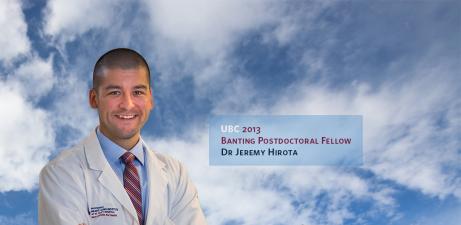
Written by Cloe Scott and used with permission.
Air quality is a hot topic, yet we know little about how exactly it affects our health. Dr. Jeremy Hirota, a post-doctoral researcher at the Centre for Heart Lung Innovation at St. Paul’s Hospital, hopes to shed more light on the issue to help determine what precautions should be taken to protect public health.
“Every day, we breathe more than 10,000 litres of air into our lungs just to survive. In the air there can be a variety of substances that can irritate the airways leading to coughing, wheezing, mucus production, and if bad enough, hospitalization. Unfortunately, for healthy individuals and those suffering from airway disease, it is difficult to control the air we breathe and we do not completely understand how poor air quality influences our health,” Hirota explains.
A recent award from the Canadian Banting Postdoctoral Fellowship Program—the most prestigious postdoctoral award in Canada—will help launch Hirota’s work in this area.
Initiated in 2010 as a competition to fund “the very best postdoctoral applicants, both nationally and internationally, who will positively contribute to the country’s economic, social and research based growth” the Canadian Banting Postdoctoral Fellowship program is awarded annually to 70 outstanding postdoctoral candidates. Each two-year fellowship is valued at $140,000.00. Praised for its unique emphasis on the synergies between the applicant and the host institution, the Banting Postdoctoral Fellowship is not only an honour bestowed upon the successful candidate, but is also a reflection of the host institution’s excellence in research and leadership as well as its dedication to mentorship.
With a passion for basic and clinical research related to the lungs, along with a humble and appreciative attitude, Hirota epitomizes the ideal candidate for the Banting Postdoctoral Fellowship program
While completing his PhD in the laboratory of Dr. Mark Inman at the Firestone Institute for Respiratory Health at McMaster University in Hamilton, Ontario, Hirota was introduced to basic and clinical research related to lung disease.
“Drs. Inman, Martin Kolb, Luke Janssen and Parameswaran Nair were mentors who shared with me their passion for research related to lung diseases,” Hirota notes. “Dr. Inman and his colleagues were integral in connecting me with national and international lung researchers.”
It was one such a connection that led Hirota across the country to Vancouver, British Columbia, where he began work in the lab of Dr. Darryl Knight at St. Paul’s Hospital. Here, he received continued support and mentorship from a world-class team of experts including, Drs. Knight, Chris Carlsten, Don Sin, and Stephan Van Eedan, during his research on the negative health consequences of poor air quality.
“These are only a few names of people that have heavily influenced my passion for research on lung function in health and disease,” says Hirota when asked about how he became involved in lung research, “I owe a considerable portion of my success to all of these individuals and many more unnamed along the way.”
Speaking highly of his mentors and influencers, Hirota recognizes the importance of mentorship for young scientists and takes a pay-it-forward approach. Next February, he will be working with the Institute for Heart + Lung Health to co-chair the annual Heart + Lung Health FEST Scientific Symposium in Vancouver, BC. Additionally, he has been actively involved with the AllerGen National Centre of Excellence as a Trainee Executive Member Representative for Western Canada.
When asked about his future goals, Hirota notes the importance of having people on board to support research, and he envisions this being achieved by heightening awareness surrounding the relationship between patient and policy. He will be keeping this goal in mind as he works with his Banting Fellowship principal supervisor, Dr. Chris Carlsten to conduct specific research related to airway disease and air quality.
“By performing my research, I hope to discover how the lungs respond to a variety of inhaled substances so that we can inform patients and the population what precautions they can take to protect themselves during periods of poor air quality.” He then plans to turn his results into evidence that can be used to influence public policy aimed at protecting air quality for the entire population, including susceptible populations suffering from airway diseases including asthma and cystic fibrosis.
Accepting the honour graciously, Hirota sees his appointment as a Banting Research Fellow as an opportunity to continue research that affects public health, in turn helping to make life easier for patients and their families.